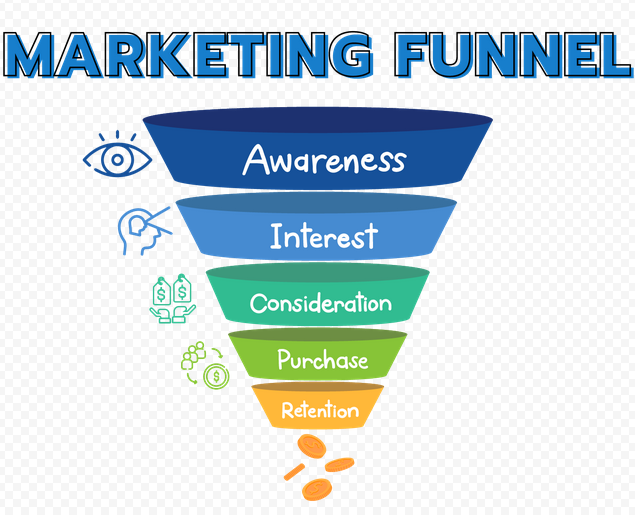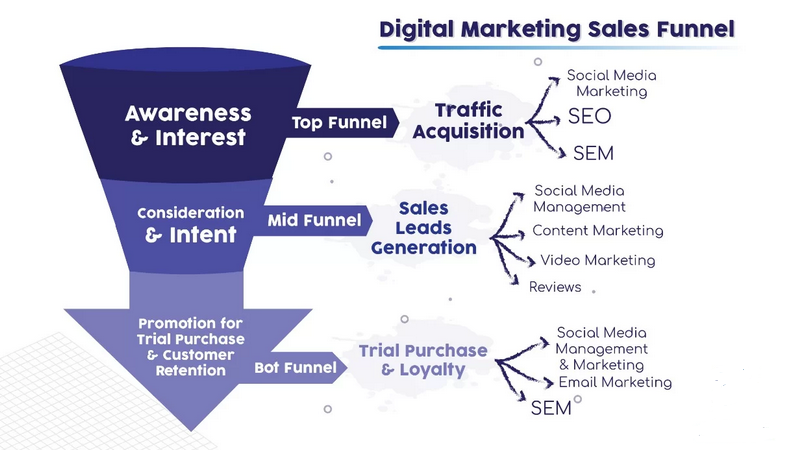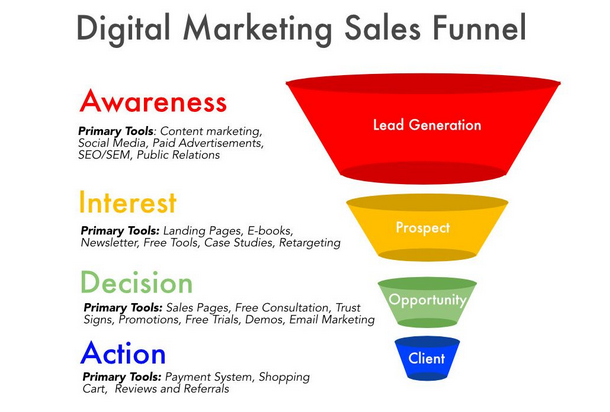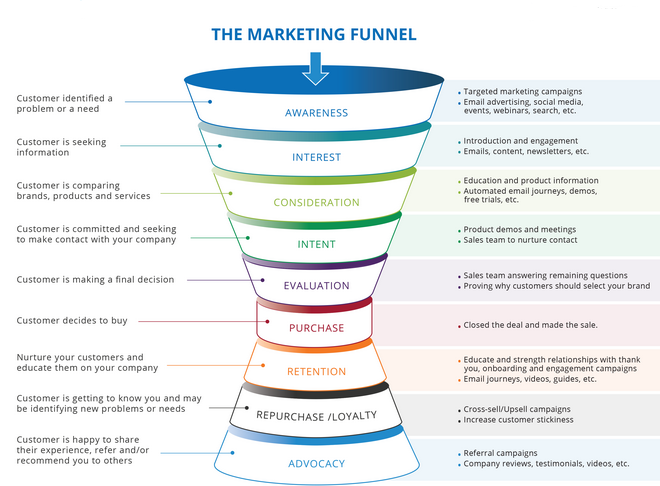techno.jagoandzgn.com – Methods Digital marketing have become the target of many people to promote their business. In actuality, it takes a while until the public decides to purchase our goods from us thanks to digital marketing. Understanding the digital marketing funnel is crucial for firms so they can properly plan out their marketing campaigns.
Many business owners hope for potential clients right away, even if they have only employed social media promotion to sell their items.It’s not wrong to expect that, but it would be nice to understand some of the stages marketing funnel when implementing this marketing strategy.
Mastering the digital marketing funnel is also beneficial for organizations in estimating the appropriate allocation of cash and resources to manage it.
It’s impossible for us to immediately become loyal customers of a fast food restaurant if we don’t know brand, right? Even after seeing the restaurant, we must first decide if the meal it will provide us is indeed delicious.
That is an example of a marketing funnel that is frequently encountered by organizations that have been pioneering for a long time.
As with businesses that run onlinestages marketing funnel. Applying it entails being able to plan marketing and generate significant earnings. To be successful in implementing each digital marketing channel, first get to know more about digital marketing funnel .
What is a marketing funnel?

The marketing funnel is a system or method for explaining the various stages that customers go through before making a purchase.
This includes all stages from awareness to the stage when they are ready to buy the product or service you offer and become a customer.
For example, if your business sells books, the marketing funnel will explain the stages from the first time audience hears your brand , for example through a blog or social media, to finally attracting their attention to make a purchase and decide to become a customer.
Marketing funnels are a way to provide visibility at every stage of your customer relationship. Whether you’re looking to make online, generate traffic to your site, or collect clicks as an affiliate, you’ll still need a marketing funnel.
The marketing funnel is considered important because it can tell you how far a prospect or lead is in the customer journey and help you identify the best strategies and types of content that can generate conversions.
Key Benefits of Digital Marketing Funnel

Digital marketing funnels are created so that businesses can use the right marketing strategies at every stage. Currently, a lot of organizations employ digital marketing, but few are aware of the stages of potential customers’ purchasing decisions. Mapping a digital marketing funnel can help businesses prepare the strategies and products they market at every stage.
The key advantage of employing a marketing funnel is that organizations may improve their marketing segmentation. They can create advertising content or social media (medsos) with messages that are more attractive and can attract the attention of potential customers.
Without a doubt, viewers on social media or websites are more likely to convert into prospects or customers. Remember that a funnel must be properly built in order to enhance conversion value even more.
Not only knowing the strategy for customers, marketing funnel can also increase the productivity of the team and the business as a whole. They will save money and effort if they can effectively develop content and adverts.
They might also concentrate on marketing tactics based on the stages that clients go through. Business owners can also “communicate” directly with their audience through content that is right for them.
Then, how to maximize digital marketing funnel to make the business more advanced? Check out the following reviews.
Marketing strategy in every marketing funnel

1. Awareness
This is the stage where people start to know your product, brand or company. This can happen in a variety of ways, such as reading one of your blog articles, hearing a podcast mentioning your brand or product, seeing an ad on Facebook, searching for something on Google and finding your site, watching one of your videos on YouTube, and so on. -other.
perspective marketing, at this stage the main goal is to introduce your brand and product to the target audience. This is the stage where all your marketing strategies and efforts should focus on attracting attention and reaching as many people as possible. Success at this stage is related to the number of leads that you can direct to the next stage of the marketing funnel .
2. Interest
At this stage your potential customers start to be captivated. They get interested and want to know more about your brand or product. They start considering your product by comparing it to other brands and then learning about the various features and benefits it offers. At this stage, the focus of all your marketing strategies is to inform the audience about your product features, benefits and advantages it has to offer.
3. Desire
This is the stage in the customer journey where potential customers really start to want your product or service and intend to make a purchase. At this stage the audience’s perspective begins to change from liking to wanting to have. From a marketing perspective, this stage is when you need to give encouragement to convert prospect customers into customers.
The main goal is to engage potential customers or customers and make them want your product over brands . It should be understood that sometimes the Interest and Desire occur simultaneously and almost simultaneously. That’s why these two stages can sometimes be combined into one funnel.
4. Action
The final stage of the marketing funnel is Action in which potential customers take the desired action and turn them into customers marketing perspective, all marketing materials in funnel must convey a sense of urgency to encourage consumers to take action that turns them into customers.
However, it is important to understand that the stages marketing funnel can be adjusted and further broken down based on the needs of each business. Sometimes marketers may use a three-stage funnel consisting oflead generation, nurturing and conversion.
Others also sometimes add marketing funnel with customer retention or remarketing after the conversion stage. That’s why, adjust marketing funnel the most effective
Example of a marketing funnel

1. An example marketing funnel of an ineffective
Norman Newbie owns a software company with ten sales and one product employees. He’s not a savvy marketer so his current sales process uses lists of potential customers purchased online and then asks his employees to call the names on the list one by one.
Employees often feel frustrated because the prospects that come are not always good. This is because they contact people who are not interested in the services offered or do not match the proposed product. The company’s employees were only able to cover less than 1% of the overall prospects they could reach.
2. An example marketing funnel of an effective
Molly Marketer has a company of a similar scale. However, instead of taking the traditional marketing approach as Norman did, he created a marketing funnel that helped his three employees get more sales with less effort.
Molly started off by building a series of marketing content linked to her website. The content catches the attention of potential consumers because they can engage with the content presented through blog articles, infographics, or videos.
Prospective customers can also learn about the ins and outs of the company and the services it offers without having to receive annoying phone calls from sales or salespeople.
3. Netflix
Netflix uses social media to create buzz about upcoming shows. The snappy summary coupled with the short clip tempts his social media followers to watch the show as it’s released.
Finally, word of mouth marketing started from social media posts that were brought into the chat of a group of friends. This is where Netflix has reached its first steps of marketing both online and offline.
Entering landing page , new visitors are asked to enter an email to start a subscription. After that, you will enter the registration stage, starting from creating a password to choosing a plan. To reassure potential customers, it says that you can cancel your subscription at any time and emphasizes that there will be no fees .
After that, you will be given several options ranging from the cheapest to the most expensive. The whole process went smoothly and built the prospect’s trust from the start.
Netflix wins the loyalty stage by bringing epic content on its platform that captivates viewers’ minds from day one.
4. Wix
builder Website, Wix, builds a marketing channel to drive new users to its website and keep them engaged with the service. The goal is to get potential customers to sign up instead of buying a premium subscription.
To let potential customers know about the brand, Wix uses SEO. Company articles appear in Google’s featured snippet for the “how to create a landing page” query. After clicking on it, Google directs potential customers to the Wix blog.
To drive new visitors to the marketing channel, Wix offers them to start building their website away. After clicking the “Start now”, the prospect opens the Wix editor. Once a visitor signs up with the service, Wix achieves its ultimate goal.
Closing
Everything about the marketing funnel and its application in marketing strategies has been explained through the article above. Now you can design marketing funnel and strategy at every stage.
It should be noted, channels marketing websites and social media are the same, so you can create content for both mediums.
The most important thing is the content of the content. Use educational content for audiences in the early stages marketing funnel , and use promotional content for conversions.
Don’t forget to look here too :
- Digital Marketing Analytics for Your Business Marketing Strategy
- Marketing Intelligence: Meaning, Components, and Tips
- SaaS Marketing : Definition, Important Aspects, and Best Marketing
- Best Social Media Marketing Strategies
- Marketing Database: Benefits & Examples of Implementing an Effective
- Digital Marketing Google Certification
- The Best E-Commerce Digital Marketing Strategy to Grow Online Business: Top 7 Picks